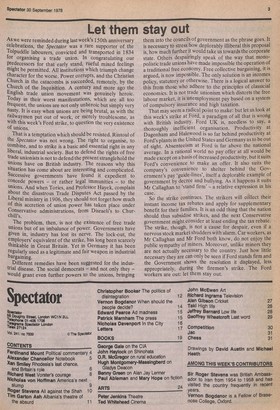Let them stay out
As we were reminded during last week's 150th anniversary celebrations, the Spectator was a rare supporter of the Tolpuddle labourers, convicted and transported in 1834 for organising a trade union. In congratulating our Predecessors for that early stand, rueful mixed feelings might be permitted. All institutions which triumph change character for the worse. Power corrupts, and the Christian Church in the catacombs is succeeded, remotely, by the Church of the Inquisition. A century and more ago the English trade union movement was genuinely heroic. Today in their worst manifestations, which are all too frequent, the unions are not only unheroic but simply very nasty. It is easy when unions are being brutal, as with the railwaymen put out of work, or merely troublesome, as
With this week's Ford strike, to question the very existence Of unions.
That is a temptation which should be resisted. Rintoul of the Spectator vias not wrong. The right to organise, to combine, and to strike is a basic and essential right in any liberal, industrial society. But to defend the rights of free trade unionists is not to defend the present stranglehold the unions have on British industry. The reasons why this situation has come about are interesting and complicated. Successive governments have found it expedient to concede powers — or rather legal immunities — to the unions. And when Tories, and Professor Hayek, complain about the disastrous Trade Disputes Act passed by the Liberal ministry in 1906, they should not forget how much of this accretion of union power has taken place under Conservative administrations, from Disraeli's to Churchill's.
The problem, then, is not the existence of free trade unions but of an imbalance of power. Governments have given in, industry has lost its nerve. The lock-out, the employers' equivalent of the strike, has long been scarcely thinkable in Great Britain. Yet in Germany it has been regularly used as a legitimate and fair weapon in industrial bargaining.
Different remedies have been suggested for the industrial disease. The social democrats — and not only they — Would grant even further powers to the unions, bringing
them into the councils of government as the phrase goes. It is necessary to stress how deplorably illiberal this proposal is, how much further it would take us towards the corporate state. Others despairingly speak of the way that monopolistic trade unions have made impossible the operation of a traditional free economy. Free collective bargaining, it is argued, is now impossible. The only solution is an incomes policy, statutory or otherwise. There is a logical answer to this from those who adhere to the principles of classicial economics. It is not trade unionism which distorts the free labour market, it is unemployment pay based on a system of compulsory insurance and high taxation. That may seem a radical point to make: but let us look at this week's strike at Ford, a paradigm of all that is wrong with British industry. Ford UK is, needless to say, a thoroughly inefficient organisation. Productivity at Dagenham and Halewood is so far behind productivity at Ford's plants in the United States and Germany as to be out of sight. Absenteeism at Ford is far above the national average. In a rational world no pay offer at all would be made except on a basis of increased productivity, but it suits Ford's convenience to make an offer. It also suits the company's convenience to shelter behind the Government's pay `guide-lines', itself a deplorable example of government by decree and bullying. As it happens it suits Mr Callaghan to `stand firm' — a relative expression in his case.
So the strike continues. The strikers will collect their instant income tax rebates and apply for supplementary benefit for their families. It is an odd thing that the nation should thus subsidise strikes, and the next Conservative government might consider at least ending the tax rebate. The strike, though, is not a cause for despair, even if a nervous stock market shudders with alarm. Car workers, as Mr Callaghan and Mr Ford both know, do not enjoy the public sympathy of miners. Moreover, unlike miners they are not actually necessary to the country. Just how little necessary they are can only be seen if Ford stands firm and the Government shows the resolution it displayed, less appropriately, during the firemen's strike. The Ford workers are out: let them stay out.


































 Previous page
Previous page